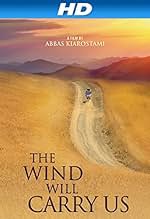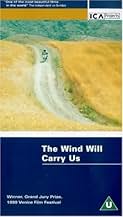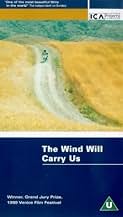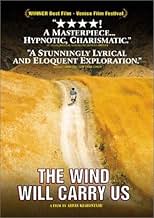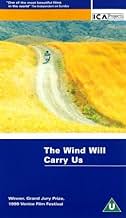IMDb RATING
7.4/10
13K
YOUR RATING
Irreverent city engineer Behzad comes to a rural village in Iran to keep vigil for a dying relative. In the meanwhile the film follows his efforts to fit in with the local community and how ... Read allIrreverent city engineer Behzad comes to a rural village in Iran to keep vigil for a dying relative. In the meanwhile the film follows his efforts to fit in with the local community and how he changes his own attitudes as a result.Irreverent city engineer Behzad comes to a rural village in Iran to keep vigil for a dying relative. In the meanwhile the film follows his efforts to fit in with the local community and how he changes his own attitudes as a result.
- Director
- Writers
- Stars
- Awards
- 4 wins & 7 nominations total
- Director
- Writers
- All cast & crew
- Production, box office & more at IMDbPro
Featured reviews
Another user who reviewed the film speaks of a film so full of 'symbolism' that he couldn't grasp. Maybe because it wasn't there? I'm generally not a fan of minimalism but Kiarostami grips me like no one else. I went out to take the trash after watching this and everything around me felt more alive, the nightsky, moon, trees blowing in the wind, I experienced all this in expansive vivid detail like new life was breathed into them. This is what a Kiarostami film does to me. It's about the sights and sounds of a life simple and profound in that simplicity, profound in the stoic sense of an old man sitting down in the same place every day to sip his tea. The wisdom here is not one of tremendous insight into something we didn't know, but a remembrance of something we knew and have forgotten and need to listen as the wind carries it back. Maybe the next world is beautiful muses a country doctor to our protagonist as they cross golden fields of wheat blowing in the wind, but no one has come back to tell us, so the present world is all we have; and how beautiful it is.
Beautiful Persian Zen.
The film is about waiting for something to happen, waiting for the death of an old woman which an engineer from Tehran and two of his associates have come to document; waiting for a narrative. Every now and then the engineer's cell phone rings, he has poor signal so he must rush to his car and drive to a nearby hill to get good signal. On top of the rocky hill there's a man digging a ditch, sight unseen, and the engineer idly chats with him down in his hole. That man digs up a thigh bone that once belonged to someone, the cemetery of the nearby village is on that hill, and throws it up to our curious protagonist. He stores it away in his car, a symbol of life come and gone. In the end he throws it down a creek and we see the old fickle bone flow down the water. All the symbolism in the film speaks for itself. Trees lush green and fields yellow golden with wheat and a hot dusty wind blowing over this.
I have great admiration for the way Kiarostami makes films. He's so open to the filmmaking process, no strings attached, script, rehearsal, staging, all the mechanics subordinate to the real deal. It takes balls to go into this with as little safeguards. A lot of the film seems to have been improvised on the spot, in that small Iranian village, the faces are real, their casual chitchat the casual chitchat of real people. Take him or leave him, not a lot of people can make films the way he does and make them good.
Beautiful Persian Zen.
The film is about waiting for something to happen, waiting for the death of an old woman which an engineer from Tehran and two of his associates have come to document; waiting for a narrative. Every now and then the engineer's cell phone rings, he has poor signal so he must rush to his car and drive to a nearby hill to get good signal. On top of the rocky hill there's a man digging a ditch, sight unseen, and the engineer idly chats with him down in his hole. That man digs up a thigh bone that once belonged to someone, the cemetery of the nearby village is on that hill, and throws it up to our curious protagonist. He stores it away in his car, a symbol of life come and gone. In the end he throws it down a creek and we see the old fickle bone flow down the water. All the symbolism in the film speaks for itself. Trees lush green and fields yellow golden with wheat and a hot dusty wind blowing over this.
I have great admiration for the way Kiarostami makes films. He's so open to the filmmaking process, no strings attached, script, rehearsal, staging, all the mechanics subordinate to the real deal. It takes balls to go into this with as little safeguards. A lot of the film seems to have been improvised on the spot, in that small Iranian village, the faces are real, their casual chitchat the casual chitchat of real people. Take him or leave him, not a lot of people can make films the way he does and make them good.
An amazing Abbas Kiarostami movie. Inspired by the poem of Furug Ferruhzad, in this film, the director tells the universality experienced in daily life in the Iranian countryside without getting involved in the slightest arabesque element.
When the epic simplicity of the movie is watched with admiration, you will feel sorry for the millions of dollars spent on Hollywood movies of the new era.
When the epic simplicity of the movie is watched with admiration, you will feel sorry for the millions of dollars spent on Hollywood movies of the new era.
A man out of time finds the way back in. And so, too, do we. Films about such big subjects, metaphysical, quasi-metaphysical, or near metaphysical, can't afford to be petty. So this one meanders, lays a loose and light hand on its subject, finds and follows it by a process of mutual discovery, audience and film maker wandering an unknown road, led by faith in a final destination.
Three men journey from Tehran to a tiny remote village for purposes unknown. Contrasts evolve between their urban modernity and the ageless life of the rural village. They're ostensibly there for the funeral of an ancient woman, a stranger, not a relative, who confounds their expectations by not dying. Let's just say, for the sake preserving the mystery, that they're there, in a way, to cheat death, to rob the villagers of a ritual they themselves fail to understand.
By way of first person narration, the film centers on their leader (Behzad Dourani), a man who accepts being called "engineer," but really isn't--or is he? The perspective is doubled: The world of the film narrowly revolves around him at the same time that it doesn't, claustrophobically relating everything to his solitary universe, at the same time that it encompasses the full scope of a world independent of him, thus giving the lie to his limitations, his distortions and blindness. This is narrative executed with great skill, care, and a free imagination.
Forced to wait, idle and deprived of most of his customary modern distractions, his anxiety, emptiness, and his unease surface; this is a man out of time, who resists the present and fights against the future. His one connection to the outside world, a cell phone, requires every time it goes off that he drop whatever he's doing to run to his truck and drive up to a mountain-top cemetery for clear reception, an association of technology with death concurrent with its indifference to and alienation from it, a comical escapade repeated periodically throughout to give the film a rhythm, an intrusive repetitious beat that contrasts with the natural rhythms of the village.
With nothing else to do, he gradually is tugged by and eventually succumbs to the life around him. This is the kind of movie in which a shot is held so a rooster can walk across the frame. We, too, are made to wait. While waiting, stuck in a plotless limbo, all sorts of beautiful and instructive things emerge from an apparently banal reality, if one cares to notice. There is the unassuming visual poetry of the world, the shadows on a wall of a woman hanging clothes, rolling hills of golden grass, and the organic architecture of a village molded into a hillside; and the subtlety of social interactions: the tender trust of a young boy; the engineer's yearning for a pot of milk, which finally leads him into a primeval cave-like cellar alone with a fecund young woman who refuses his money; the casualness of the birth of a neighbor woman's 10th child; the shrewish complaints of a cafe proprietor, which are answered by one her customers with implacable peasant wisdom; and so on, one scene following upon another, small miracles falling into our laps unannounced.
If only this process of poetic inference, metaphor, indirection, and openness were in more widespread use, commonly adapted, thus more fully developed, instead of the literal dry analytic "objectivity" which tyrannizes modern fictions, nails meaning as if to a cross. Here there isn't even a hint of manipulation or exploitation, not a drop of didacticism. Instead, Kiarostami achieves the difficult feat of keeping water in cupped hands. The film teaches us to observe nature by observing nature.
Three men journey from Tehran to a tiny remote village for purposes unknown. Contrasts evolve between their urban modernity and the ageless life of the rural village. They're ostensibly there for the funeral of an ancient woman, a stranger, not a relative, who confounds their expectations by not dying. Let's just say, for the sake preserving the mystery, that they're there, in a way, to cheat death, to rob the villagers of a ritual they themselves fail to understand.
By way of first person narration, the film centers on their leader (Behzad Dourani), a man who accepts being called "engineer," but really isn't--or is he? The perspective is doubled: The world of the film narrowly revolves around him at the same time that it doesn't, claustrophobically relating everything to his solitary universe, at the same time that it encompasses the full scope of a world independent of him, thus giving the lie to his limitations, his distortions and blindness. This is narrative executed with great skill, care, and a free imagination.
Forced to wait, idle and deprived of most of his customary modern distractions, his anxiety, emptiness, and his unease surface; this is a man out of time, who resists the present and fights against the future. His one connection to the outside world, a cell phone, requires every time it goes off that he drop whatever he's doing to run to his truck and drive up to a mountain-top cemetery for clear reception, an association of technology with death concurrent with its indifference to and alienation from it, a comical escapade repeated periodically throughout to give the film a rhythm, an intrusive repetitious beat that contrasts with the natural rhythms of the village.
With nothing else to do, he gradually is tugged by and eventually succumbs to the life around him. This is the kind of movie in which a shot is held so a rooster can walk across the frame. We, too, are made to wait. While waiting, stuck in a plotless limbo, all sorts of beautiful and instructive things emerge from an apparently banal reality, if one cares to notice. There is the unassuming visual poetry of the world, the shadows on a wall of a woman hanging clothes, rolling hills of golden grass, and the organic architecture of a village molded into a hillside; and the subtlety of social interactions: the tender trust of a young boy; the engineer's yearning for a pot of milk, which finally leads him into a primeval cave-like cellar alone with a fecund young woman who refuses his money; the casualness of the birth of a neighbor woman's 10th child; the shrewish complaints of a cafe proprietor, which are answered by one her customers with implacable peasant wisdom; and so on, one scene following upon another, small miracles falling into our laps unannounced.
If only this process of poetic inference, metaphor, indirection, and openness were in more widespread use, commonly adapted, thus more fully developed, instead of the literal dry analytic "objectivity" which tyrannizes modern fictions, nails meaning as if to a cross. Here there isn't even a hint of manipulation or exploitation, not a drop of didacticism. Instead, Kiarostami achieves the difficult feat of keeping water in cupped hands. The film teaches us to observe nature by observing nature.
An engineer (Behzad Dourani) travels to a remote Iranian village on an inexplicable assignment that involves his unseen assistants digging holes. The men work near a hill that turns out to be one of the main settings, and even characters, in Cannes Palme d'Or winner Abbas Kiarostami's new movie, "The Wind Will Carry Us."
Throughout the picture, the perpetually befuddled engineer drives up to the breezy incline to receive cell phone calls that don't come through clearly in the village below. Do the calls concern an old woman who's dying? A search for buried treasure? The exhumation of dead bodies? We never hear the other end of the conversations, so we never find out.
The modern hero's jeep and cell-phone dominated life seems empty of purpose, other than the impulses and sensory input of the moment. The lives of the traditional villagers don't seem any more meaningful. Kiarostami's picture is no ethnographic celebration of simple-hearted, but wise peasants with a profound culture.
The movie is like Samuel Becket's definitive theatre of the absurd, "Waiting for Godot." But while the depressed Irish playwright's characters wander around in a desolate landscape, Kiarostami's engineer is placed in a spacious, richly colored world that yields tantalizing, paradoxical hints of meaning, despite the random, aimless movements of the human beings who inhabit it.
Perhaps we're seeing this story from the wind's point-of-view.
Throughout the picture, the perpetually befuddled engineer drives up to the breezy incline to receive cell phone calls that don't come through clearly in the village below. Do the calls concern an old woman who's dying? A search for buried treasure? The exhumation of dead bodies? We never hear the other end of the conversations, so we never find out.
The modern hero's jeep and cell-phone dominated life seems empty of purpose, other than the impulses and sensory input of the moment. The lives of the traditional villagers don't seem any more meaningful. Kiarostami's picture is no ethnographic celebration of simple-hearted, but wise peasants with a profound culture.
The movie is like Samuel Becket's definitive theatre of the absurd, "Waiting for Godot." But while the depressed Irish playwright's characters wander around in a desolate landscape, Kiarostami's engineer is placed in a spacious, richly colored world that yields tantalizing, paradoxical hints of meaning, despite the random, aimless movements of the human beings who inhabit it.
Perhaps we're seeing this story from the wind's point-of-view.
This is poetry. The landscapes filmed by Kiarostami are beautiful. The cinematography is just fabulous. It is a very simple and honest movie, about life, and death too. It just flows... Most of the people seen in the movie are not actors, they are really just the population of Siah Dareh and that makes this look real, not some fake pretentious bullshit like many we see nowadays. The interaction with the little boy is truly touching. I loved this and you will either love it or find it the most boring movie ever. It isn't, really and if you do find it boring, maybe your own true self isn't just ready for this type of film. I truly recommend it. The words "bad ma ra khahad bord" will remain with me forever. I was marked by this beautiful piece of art.
Did you know
- TriviaThe title is a reference to a poem written by famous modern Iranian female poet Forough Farrokhzad.
- GoofsWhen the engineer is driving back from the mountain, he stops and picks up someone who is walking down the road and starts talking to him, but when the camera shows the car from long shot for the first time, there is no one in the car other than the engineer.
- How long is The Wind Will Carry Us?Powered by Alexa
Details
- Release date
- Country of origin
- Official site
- Languages
- Also known as
- El viento nos llevará
- Filming locations
- Production company
- See more company credits at IMDbPro
Box office
- Gross US & Canada
- $259,510
- Opening weekend US & Canada
- $21,417
- Jul 30, 2000
- Gross worldwide
- $259,510
Contribute to this page
Suggest an edit or add missing content

